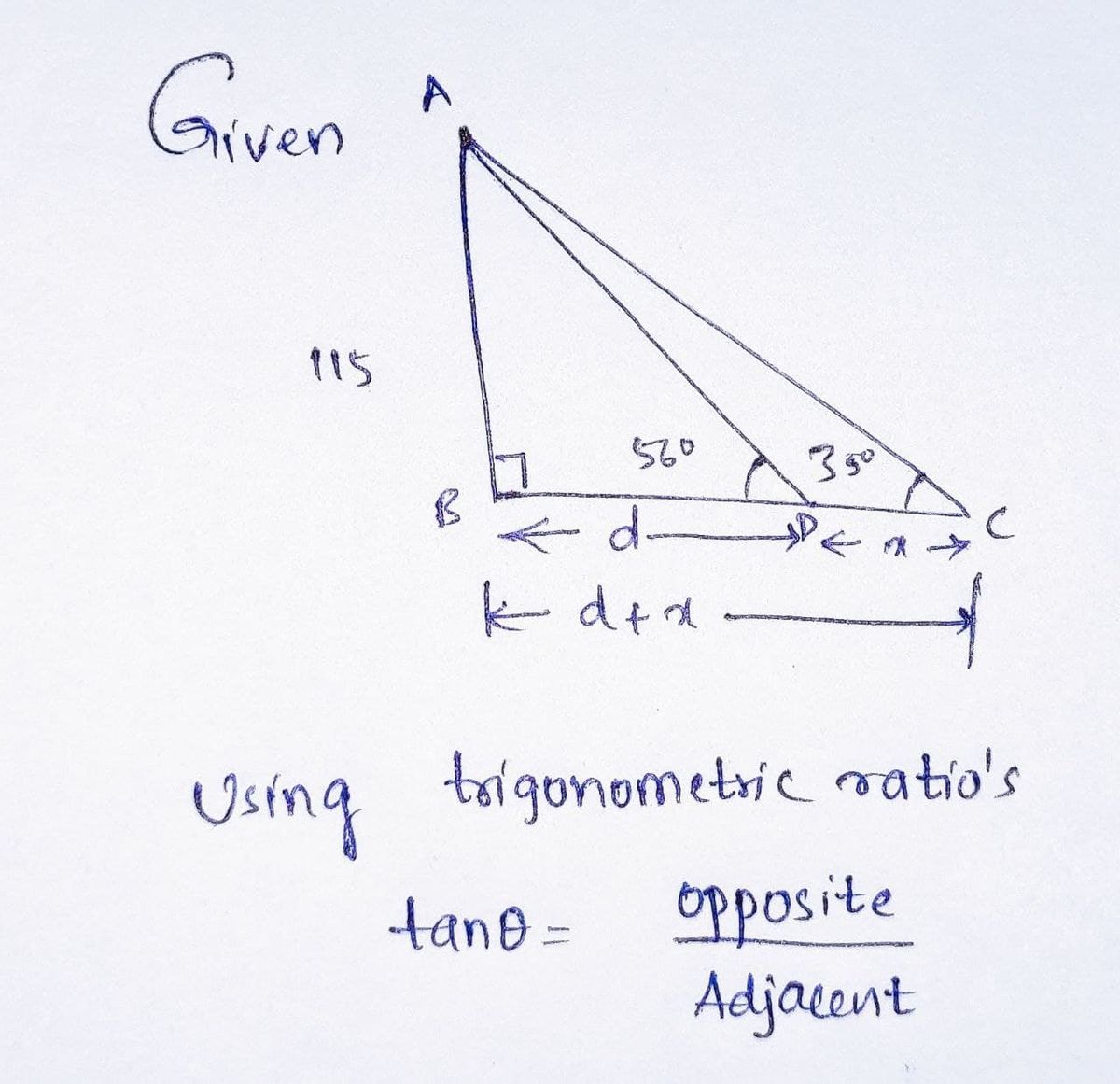**Title: Solving for the Value of x in a Triangle** **Introduction:** This problem involves finding the value of the variable \( x \) in a geometric setup involving triangles. Understanding the relationship between the angles and sides of a triangle will be key in solving this problem. **Diagram Explanation:** We have a diagram of a right triangle with the following components: - One angle is marked as \( 50^\circ \). - Another angle is marked as \( 30^\circ \). - There is a right angle at the base, denoted by the square corner. - The side opposite the \( 30^\circ \) angle is labeled as \( x \). - The adjacent side to the \( 30^\circ \) angle, parallel to the base, is given as \( 115 \). **Problem Statement:** Find the value of \( x \). **Steps to Solve:** 1. Recognize that since the triangle is a right triangle, the angles must add up to \( 180^\circ \). 2. Use the fact that the sum of angles in a triangle is \( 180^\circ \) to find any missing angle. 3. Apply trigonometric ratios (sine, cosine, or tangent) to solve for \( x \). **Conclusion:** Using the relationships between the triangle's angles and applying basic trigonometric identities, the value of \( x \) can be determined. This exercise provides practical experience in applying geometric principles and trigonometry to solve for unknown variables.
**Title: Solving for the Value of x in a Triangle** **Introduction:** This problem involves finding the value of the variable \( x \) in a geometric setup involving triangles. Understanding the relationship between the angles and sides of a triangle will be key in solving this problem. **Diagram Explanation:** We have a diagram of a right triangle with the following components: - One angle is marked as \( 50^\circ \). - Another angle is marked as \( 30^\circ \). - There is a right angle at the base, denoted by the square corner. - The side opposite the \( 30^\circ \) angle is labeled as \( x \). - The adjacent side to the \( 30^\circ \) angle, parallel to the base, is given as \( 115 \). **Problem Statement:** Find the value of \( x \). **Steps to Solve:** 1. Recognize that since the triangle is a right triangle, the angles must add up to \( 180^\circ \). 2. Use the fact that the sum of angles in a triangle is \( 180^\circ \) to find any missing angle. 3. Apply trigonometric ratios (sine, cosine, or tangent) to solve for \( x \). **Conclusion:** Using the relationships between the triangle's angles and applying basic trigonometric identities, the value of \( x \) can be determined. This exercise provides practical experience in applying geometric principles and trigonometry to solve for unknown variables.
Trigonometry (11th Edition)
11th Edition
ISBN:9780134217437
Author:Margaret L. Lial, John Hornsby, David I. Schneider, Callie Daniels
Publisher:Margaret L. Lial, John Hornsby, David I. Schneider, Callie Daniels
Chapter1: Trigonometric Functions
Section: Chapter Questions
Problem 1RE:
1. Give the measures of the complement and the supplement of an angle measuring 35°.
Related questions
Question

Transcribed Image Text:**Title: Solving for the Value of x in a Triangle**
**Introduction:**
This problem involves finding the value of the variable \( x \) in a geometric setup involving triangles. Understanding the relationship between the angles and sides of a triangle will be key in solving this problem.
**Diagram Explanation:**
We have a diagram of a right triangle with the following components:
- One angle is marked as \( 50^\circ \).
- Another angle is marked as \( 30^\circ \).
- There is a right angle at the base, denoted by the square corner.
- The side opposite the \( 30^\circ \) angle is labeled as \( x \).
- The adjacent side to the \( 30^\circ \) angle, parallel to the base, is given as \( 115 \).
**Problem Statement:**
Find the value of \( x \).
**Steps to Solve:**
1. Recognize that since the triangle is a right triangle, the angles must add up to \( 180^\circ \).
2. Use the fact that the sum of angles in a triangle is \( 180^\circ \) to find any missing angle.
3. Apply trigonometric ratios (sine, cosine, or tangent) to solve for \( x \).
**Conclusion:**
Using the relationships between the triangle's angles and applying basic trigonometric identities, the value of \( x \) can be determined. This exercise provides practical experience in applying geometric principles and trigonometry to solve for unknown variables.
Expert Solution
Step 1

Step by step
Solved in 2 steps with 2 images

Recommended textbooks for you

Trigonometry (11th Edition)
Trigonometry
ISBN:
9780134217437
Author:
Margaret L. Lial, John Hornsby, David I. Schneider, Callie Daniels
Publisher:
PEARSON

Trigonometry (MindTap Course List)
Trigonometry
ISBN:
9781305652224
Author:
Charles P. McKeague, Mark D. Turner
Publisher:
Cengage Learning


Trigonometry (11th Edition)
Trigonometry
ISBN:
9780134217437
Author:
Margaret L. Lial, John Hornsby, David I. Schneider, Callie Daniels
Publisher:
PEARSON

Trigonometry (MindTap Course List)
Trigonometry
ISBN:
9781305652224
Author:
Charles P. McKeague, Mark D. Turner
Publisher:
Cengage Learning


Trigonometry (MindTap Course List)
Trigonometry
ISBN:
9781337278461
Author:
Ron Larson
Publisher:
Cengage Learning